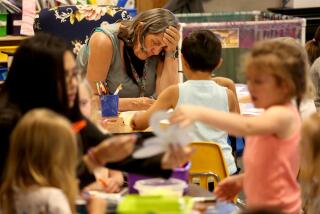Sit Down, Plug In and Surf to Head of Class
Someday, every high school classroom might resemble Room 304 at Villa Park High.
Students enter their morning English class, pop open their laptop computers, plug them into the portals at their desks and browse the Internet to find potential topics for research projects. They e-mail their homework to 11th-grade English teacher Connie Bohnert, who has posted her assignments and lecture notes on the class’ animated Web page. Each student will soon create a personal Web page to showcase his or her work.
As an unprecedented level of state funding for technology makes its way into Orange County’s high schools through the Digital High School program, a handful of districts have wired classrooms to accommodate special new classes taught exclusively for students who have their own laptop computers. Computer-based programs at Irvine and Mission Viejo high schools are in their second year. The laptop learning classes at Villa Park--for 26 students who take their 11th-grade English and U.S. history classes together--are barely a month old.
At their best, the programs open vast new learning opportunities. Students become computer-savvy and can tap into virtually unlimited research opportunities, all while absorbing the same subject matter as their peers in traditional classes.
Yet even as districts pounce on the idea of paperless classrooms with enthusiasm and pride, the classroom of the future is not necessarily ready for the student of the present.
That’s because no amount of cutting-edge technology can make up for a teacher who doesn’t know how to use it. On a recent day at Villa Park, students were on their own for an entire class period while their U.S. history teacher struggled to post the day’s assignment on the class Web page. At one point during the 55-minute class, more than a third of the students were playing computer games. The rest surfed the Internet, talked or completed work for other classes.
And technical glitches aside, some critics contend that it’s unfair to have programs just for students whose families can afford a $1,200 to $2,000 laptop computer.
But while some parents complain that these programs create inequity, administrators at all three schools said they have mechanisms in place to ensure that no child who wants to participate will be turned away; measures include lending school-owned computers to PTA-sponsored scholarships. Administrators also point out that used laptops can sell for as little as $500, and a new machine that meets the classes’ minimum requirements can be leased for as little as $30 a month.
With computer companies such as Microsoft and Toshiba eagerly peddling the virtues of the portable classroom, such classes are surely on the rise. Still, laptop education will have to clear numerous hurdles before it becomes the norm.
But for 23-year teaching veteran Ron Archer, who is team-teaching an 11th-grade laptop English and U.S. history class at Mission Viejo High School this year, the advantages of an electronic classroom are evident.
“I’m in a situation where I can see the kids’ homework that they have done before they even return to class, because they e-mail it to me. At 6 a.m. I can look at their paragraphs and say, ‘Oh, they need to work on this.’ By the time they arrive at 8 a.m., I can be ready to work on what they need,” he said.
On the flip side, parents also have an easy way to keep up on what their kids are learning through the class Web site, https://www.AmericanJourney.net.
“We go with the idea that we’re not teaching technology. We’re teaching using technology,” Archer said.
*
To prepare for his electronic teaching assignment, Archer attended a weeklong training seminar in the summer, as have the other three laptop teachers at Mission Viejo High. Also, Archer said he has read up on the topic on his own and received tutorials from his 13-year-old child.
Making sure that teachers are prepared to use the technology is vital, said Mission Viejo High School parent and computer entrepreneur Jack Allweiss, who heads the school’s technology committee. Allweiss was instrumental in helping Mission Viejo launch its laptop program a year ago.
“You’ve got to invest in the teachers first,” Allweiss said. “The reality is these kids have grown up with technology.”
Mission Viejo now offers four laptop classes, involving four teachers and about 120 students in 10th and 11th grades.
At Villa Park, the program’s first month was somewhat rocky, students said. Since the school learned only in August that it would be able to offer the class, teachers had little time to learn the technical ins and outs of running a class online before school opened.
“We’re a little bit behind in history,” Bill Backstrom said of his online U.S. history class at Villa Park. As a result, students said he recently had to delay an exam for his electronic class so he could bring students up to speed with his traditional classes.
Gwen Davis, educational technology administrator for the Orange Unified School District, said she has been personally training the two Villa Park teachers since August.
“These people are excellent teachers, and all we’re doing is empowering them with technology,” Davis said. “They’re learning more each day.”
And several students said that despite the somewhat disappointing start, they already think the classes are worthwhile.
Brett Gereau, 16, said he loves taking his classes online, adding that because his mother spent so much money on the laptop, he feels more motivated to succeed.
“I think it’s really interesting that we’re going to make our own Web pages,” Brett said. “That’s what I’m shooting for, learning about computers, because that’s where the future is.”
“I think it’s a wonderful opportunity,” said Brett’s classmate Katie Lambert, 16, as she surfed the Web for a research project topic in Bohnert’s English class.
Lambert’s mother, Sheryl, a graphic designer whose career depends on computers, agreed that the opportunity was too good to pass up--even though it meant she had to take out a loan to finance Katie’s new laptop computer.
“It was a sacrifice, but I do think it’s worth it,” Sheryl Lambert said. “This is my way of getting her to type and learn how to use the computer. From the time she gets home, she’s on it almost until she goes to bed.”
The investment has proved less satisfying for Irvine High School parent Donna Confer, who leased son Christopher’s $2,500 laptop last year for $100 a month so he could take classes online.
“They made this sound like it was just going to be wonderful, and it hasn’t been anything that they promised,” she said.
Irvine High School launched the most ambitious program in the county last year, drawing some 50 students for ninth-grade English, Spanish and world studies classes. But despite an enthusiastic sales pitch last fall, it was April before the classrooms were outfitted with the necessary networking hardware. Students did their computer work in the school library.
Christopher, 15, said he learned a lot about technology in his 10th-grade world studies class last year. His English teacher was less successful in making use of the electronic resources. “In English, we just used it to take notes and type our projects,” he said.
This year Irvine High has expanded its electronic offerings to include geometry, 10th-grade English and Spanish II. But even though the classrooms are fully networked now, Christopher said his teachers are using the laptops even less. Now, he said, he doesn’t even bother carrying his computer to school.
“I think they jumped in the water before they knew how to swim,” Donna Confer said. “It has such great potential. I just feel like they don’t know what they’re doing with it.”
Irvine High School Assistant Principal Fran Antenore, who heads the school’s technology programs, agrees that there is work to be done but said she believes the program is already a success.
“I give a lot of credit to these teachers,” Antenore said. “They’re pioneers in this field. They’re really just stepping over into an abyss.”
More to Read
Sign up for Essential California
The most important California stories and recommendations in your inbox every morning.
You may occasionally receive promotional content from the Los Angeles Times.










